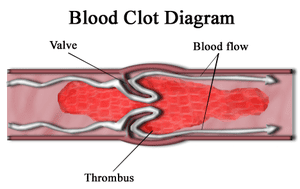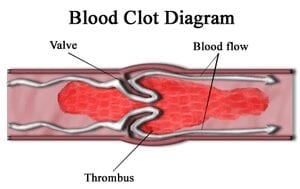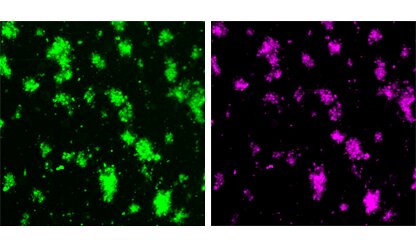
“Our results demonstrate that synthetic biomarkers can be engineered to sense vascular diseases remotely from the urine”
Detecting dangerous blood clots, which can cause life-threatening conditions such as strokes and heart attacks, leading causes of death for men and women in the U.S., has been a coveted and elusive goal. But scientists are now reporting progress in the form of a simple urine test. Their study, in which they demonstrated that the test works using laboratory mice, appears in the journalACS Nano.
Sangeeta N. Bhatia and colleagues, including lead author and Ph.D. candidate Kevin Lin and postdoctoral fellow Gabriel Kwong, point out that blood clots — clumps of platelets and fibrin proteins — can threaten to choke off blood flow and lead to a wide range of serious and sometimes fatal conditions including atherosclerosis and stroke. Usually, blood clots are a good thing. They form a plug that stops the bleeding after an injury. But sometimes, a clot forms when it really isn’t needed, such as when a person sits too long on a long-distance flight and develops “deep-vein thrombosis.” In that case, a clot forms in the leg, blocking blood flow and causing leg pain. But it also can dislodge and move throughout the body to the heart or even the brain, which is life-threatening. Diagnosing a blood clot, or thrombosis, is tricky, however, and current clinical tests aren’t always reliable. Bhatia’s team wanted to develop a simple and more reliable way to test for these obstructive blood clots.
They describe development and testing of “synthetic biomarkers” — lab-made materials for detecting what is going on in the body. They added small pieces of proteins called peptides onto nanomaterials that are similar to those already approved and used in the clinic. They injected the tiny nanomaterials into mice, which are stand-ins for humans. The peptides got chopped up if a blood clot was actively forming in the mice, and those peptide fragments were detected in a simple urine test. “Our results demonstrate that synthetic biomarkers can be engineered to sense vascular diseases remotely from the urine and may allow applications in point-of-care diagnostics,” the researchers state.
Go deeper with Bing News on:
Detecting blood clots
- Blood test may be able to detect osteoarthritis 8 years earlier than X-ray
A blood test could help predict knee osteoarthritis at least eight years before the signs of the disease show up on X-rays, a new study indicates.
- Blood test can detect signs of knee condition 8 years before X-rays
A simple blood test can detect early warning signs of a painful condition up to eight years before it appears on X-rays. The accuracy of the test that identifies tell-tale signs of knee osteoarthritis ...
- Use of antipsychotic meds for older adults drops after warning letter from Medicare
Warning letters sent by Medicare officials can prompt a decline in antipsychotic prescriptions for seniors with dementia, a new study finds.
- BD conducts roadshows to create awareness, enable knowledge-sharing around Venous diseases
Venous disease is a condition where the veins in the body have difficulty returning blood to the heart, thereby resulting in blood clot forming in a vein, typically in the legs. If left untreated, ...
- ‘Unsustainable’: UK predicted to see 50% spike in strokes by 2035
Stark new projections suggest annual admissions will rise to 151,000, costing the NHS and economy £75bn ...
Go deeper with Google Headlines on:
Detecting blood clots
[google_news title=”” keyword=”Detecting blood clots” num_posts=”5″ blurb_length=”0″ show_thumb=”left”]
Go deeper with Bing News on:
Synthetic biomarkers
- Compare with Ironwood Pharmaceuticals Inc (IRWD)
Select "Add to Compare" to begin comparing Stocks, ETFs, Mutual Funds and more.
- APCCC 2024: PARP Inhibition Dissected – in Which DNA Repair Gene Alterations Works Which PARP Inhibitor?
Advanced Prostate Cancer Consensus Conference (APCCC) meeting featured a session on the management of metastatic castration resistant prostate cancer (mCRPC), and a presentation by Dr. Johann De Bono ...
- IDEAYA Biosciences Announces Inducement Grants under Nasdaq Listing Rule 5635(c)(4)
IDEAYA Biosciences, Inc. (NASDAQ: IDYA), a precision medicine oncology company committed to the discovery and development of targeted therapeutics, today announced that, on April 25, 2024, the ...
- AI Tool Creates ‘Synthetic’ Images of Cells for Enhanced Microscopy Analysis
AI models learn how to carry out such tasks by using a set of data that are annotated by humans, but the process of distinguishing cells from their background, called “single-cell segmentation,” is ...
- Targeted Therapy, Treatment Disparity Featured at Cancer Meeting
Leading cancer researchers from UC San Francisco presented talks about advances in targeted therapy, cancer genomics, eliminating treatment disparities and other cancer research topics at this year’s ...
Go deeper with Google Headlines on:
Synthetic biomarkers
[google_news title=”” keyword=”synthetic biomarkers” num_posts=”5″ blurb_length=”0″ show_thumb=”left”]











